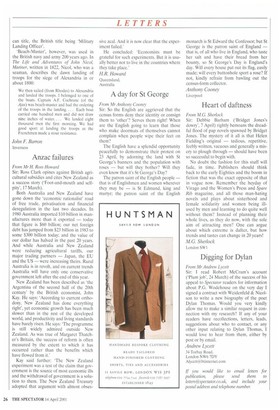Anzac failures
From Mr H. Ross Howard Sir: Ross Clark opines against British agricultural subsidies and cites New Zealand as a success story (Toot-and-mouth and selfpity', 17 March).
Both Australia and New Zealand have gone down the 'economic rationalist' road of free trade. privatisation and financial deregulation in the last two decades. In 1980 Australia imported $10 billion in manufactures more than it exported — today that figure is $60 billion; our net foreign debt has jumped from $23 billion in 1983 to some $300 billion today; and the value of our dollar has halved in the past 20 years. And while Australia and New Zealand were reducing agricultural tariffs, our major trading partners — Japan, the EU and the US — were increasing theirs. Rural Australia is in revolt, and on current trends Australia will have only one conservative government left after the end of this year.
New Zealand has been described as 'the Argentina of the second half of the 20th century' by the British economist, John Kay. He says: 'According to current orthodoxy, New Zealand has done everything right', yet economic growth has been much slower than in the rest of the developed world, and productivity and living standards have barely risen. Ile says: 'The programme is still widely admired outside New Zealand. As was true of Margaret Thatcher's Britain, the success of reform is often measured by the extent to which it has occurred rather than the benefits which have flowed from it.'
Kay said further: 'The New Zealand experiment was a test of the claim that government is the source of most economic ills and the withdrawal of government is a solution to them. The New Zealand Treasury adopted that argument with almost obses sive zeal. And it is now clear that the experiment failed.'
He concluded: 'Economists must be grateful for such experiments. But it is usually better not to live in the countries where they take place.'
H.R. Howard
Queensland, Australia


























































 Previous page
Previous page